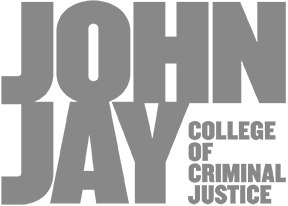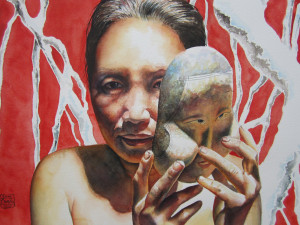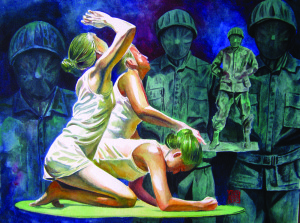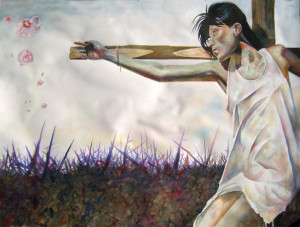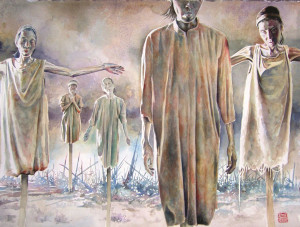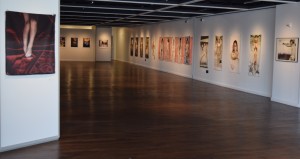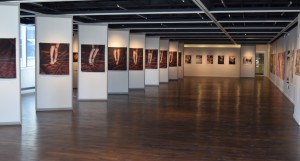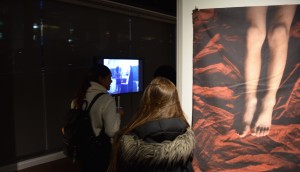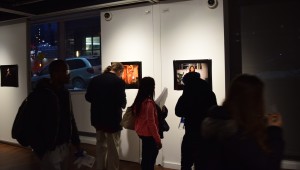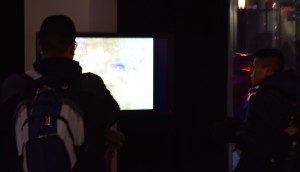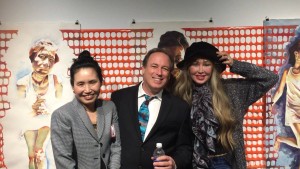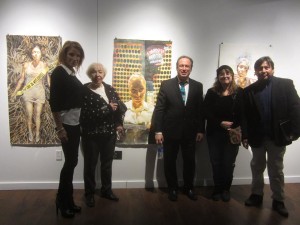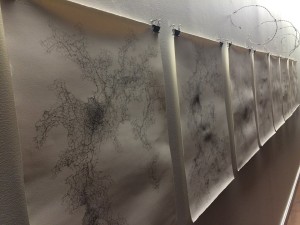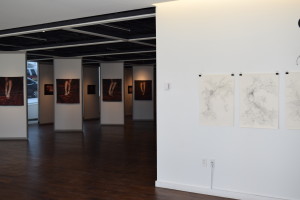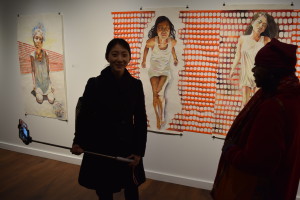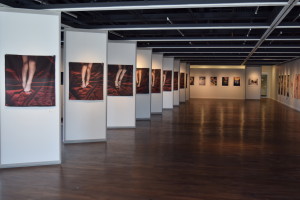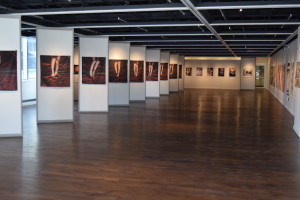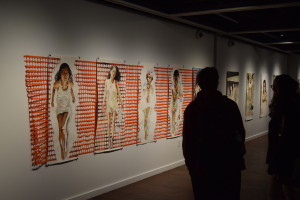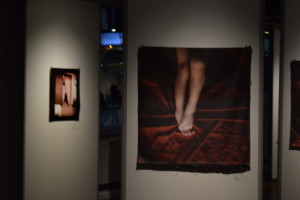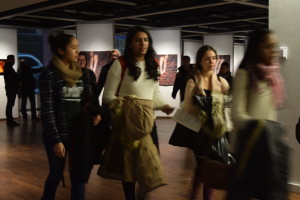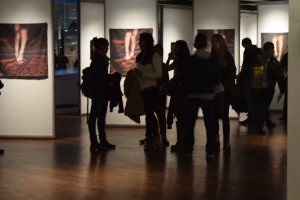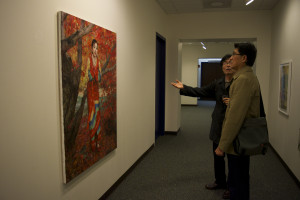On view from February 17, 2015-April 3, 2015
Anya and Andrew Shiva Gallery
The title of this show is inspired by W. Somerset Maugham’s 1915 novel much of which is autobiographical and in turn, was based on Part IV of Spinoza’s Ethics. Also subtitled Strength of Emotions it is about humanity’s lack of control that can result in a type of enslavement. Perhaps the most destructive of these emotions is the drive for profit which is to a large extent responsible for people’s inhumanity to each other.
Exploitation occurs in multiple ways and in a variety of different industries, this exhibition highlights one small part of that experience, which is exploitation within the sex trade. It is a basic human rights violation that results in the commodification of humans. The victims can span all ages and gender identities orphaned, runaways, and others marginalized by poverty, documentation status, and structural inequity.
Individuals who are exploited through force, fraud and coercion in the sex industry are just one small part of the larger portrait of global inequity. Structural forces such as documentation issues, racial and ethnic barriers, discrimination against trans* and gender non-conforming individuals, and the many ways people face criminalization and poverty make individuals vulnerable to exploitative situations. Trafficking occurs when another exploits those vulnerabilities, whether through the sex trade or other industries. Even within the course of one person’s experience, they may move through multiple trafficking situations in domestic work, factory labor, hospitality, or agriculture.
The five artists in this show Steven Cavallo, Eleni Lyra, Yiannis Christakos, Angelo Gavrias and Photini Papahatzi explore their feelings on the subject of trafficking into the sex trade. Some of their works deal directly with the subject as do Cavallo’s, Gavrias’ or Papahatzi’s while others comment on the topic in a subtler more abstract way as do Christakos and Lyras. Steven Cavallo began his research into the subject of Comfort Women forced into sexual slavery during WWII in Korea by Japanese soldiers. He portrays women in a series of watercolor portraits with battered faces on torn and burnt paper, mounted on burlap. They are suspended in midair as if saying “We have no place to rest our feet” a quote from a former comfort woman who to this day has no promise in her future but who instead is forced to drift through life. In his latest paintings he focuses on human trafficking today and claims that “the method of abduction has not changed much, since the days of 1942 nor have the stigma attached, the struggle to re-enter society, the lies told, the lives destroyed, and the families affected.”
Asian women of today have been sold by families, deceived by employers and encouraged by the government to work in cities that are frequented by U.S. soldiers, as hostesses in bars. These so-called bar hostesses were forced into prostitution gradually as they fell into debt to their bosses. Cavallo’s women are portrayed as victims and martyrs bodies twisted, or with thorns alluding to the Crucifixion. They are not one particular woman but the features are culled from many with their physical beauty bruised, twisted, contorted or battered. Nevertheless their underlying beauty is unmarred and their spirit often betrays their hoped for futures.
Yiannis Christakos’ recent series entitled Under My Gaze is informed by a variety of sources including satellite photographs, maps, computer graphics, and even stitching resulting in fragile networks reminiscent of landscapes or maps, and viaducts created out of cotton threads or string. He explores new methodologies of using line as medium in relation to his artistic practice in traveling through an imaginary landscape while covering the serious issue of human trafficking through geographic borders.
His complex linear networks are maps that could represent those of the Balkan countries bordering Greece where Christakos lives and where human trafficking is rampant. Millions of victims are trafficked yearly in politically and economically unstable bordering countries Albania, Yugoslavia, Moldova, Bulgaria, Turkey, Macedonia where approximately 200,000 women and children are taken each year into this industry.
Christakos’s drawings and paintings can be read as maps but also as thorns of martyrdom and because they contain stitching were before feminism, seen as “women’s work.” In fact he was influenced to stitch his canvases by his mother’s work as seamstress and thus breaks with gender biased allocations such as that of “women’s work.” These stitches result in a personal cartography involving memory, emotion, symbol and are like pictorial collages. Furthermore, Christakos imbeds videos and text within his topographies that contain testimonies from trafficked individuals speaking their own language, while relating their personal Golgothas.
Photini Papahatzi’s photographs and video Studio Utopia examines human exploitation through testimonies of immigrants from Albania, Bulgaria, Romania in the brothels of Athens, Greece. They have been made to prostitute themselves for 15 Euros and then to move into, so-called studios. In Studio Utopia video a taxi driver describes the spread of such studios revealing that he also prostituted women from Russia. Such individuals were driven by poverty into these desperate circumstances by rough childhoods, dangerous family conditions, tricked by pimps into thinking they would have a better future, single motherhood, and other causes.
Papahatzi’s second series Elevador consists of photographs, video and performance and addresses sexuality, media, gender and prostitution. It takes place in Salvador de Bahia that refers to Brazil’s iron monumental elevator built in 1873 that separates the upper and lower cities. Upper City called Pelourinho meaning whipping post, is the locus of the slave trade with prostitutes aged from 12-26. In the Lower City or Codade Baixa where the poorest live, the prostitutes are older and cost less. Most are crack addicts and are forced to fish for clients by the docks where pimps sell them for as little as $2.
Eleni Lyra’s work comprises 9 photographs digitally printed on fabric panels depicting children’s legs on red cloth. The youngsters’ legs are spindly, and appear malnourished and are in some of the works, crossed and hanging reminiscent of the Crucifixion. Indeed they can be read as martyred children not only because of their legs’ positioning but also because of the red cloth that serves as background which we associate with Christ’s passion.
Child trafficking has become a subject of increasing concern in unstable countries transitioning to market economies especially for post-Soviet countries and Eastern Europe. These victims are usually under 12 years old and are made to beg, rob, and undertake other street crimes for the bosses who abuse them daily. The ones over 15 years of age are pressed into sexual slavery for commercial purposes. Especially vulnerable are ones with disabilities and gypsy children sold abroad who have suffered from domestic violence, school drop outs, or who have already been in institutions. Lyra’s photographs even while representing the general characteristics of martyred children because of their subject, their simplicity and strong color, have a powerful and lasting impact upon the viewer.
In Germany where the artist Angelo Gavrias lives and works prostitution was legalized in 2001 yet human trafficking and exploitation are still significant problems. According to a Spiegel article, about 65% of what are called ‘migrant sex workers’ come from Romania, and Bulgaria and are expected to accommodate large numbers of clients while being locked up in brothels. Politicians promote the ‘respectable whore’ myth in which women have chosen freely to do this work. Police are convinced that the choice was theirs so are absolved for their inaction. However, those in the know realize that in fact legalizing prostitution in Germany, has served to create a subsidy program for pimps making trafficking even more attractive as an industry.
Gavrias depicts this social reality by photographing a young Croatian single mother named Nada during her work. His photographic series entitled Social Strip has won prizes for its strength of character and portrayal of the subject. Nada goes through her life entrapped by circumstances without any hope of escape to perform various sex acts in order to support her family. Gavrias has captured her wearing a pink wig, huge sunglasses, and leather accessories or has subtly shown only her white and purple high heel pumps. He also shows us the accompanying career addictions; cigarettes, alcohol, sexy lingerie, spike heels, and snazzy electronics. However, Gavrias goes beyond documentation by presenting us with the theater of the profession capturing Nada for instance, while dressing for clients with ten inch heels and baby dolls. In general, Gavrias delivers a true picture of the girl without critiquing her circumstances but, rather, sympathizing with her plight.
Curated by Dr. Thalia Vrachopoulos
SYMPOSIUM
Tuesday, March 3rd, 2015 5:30-7:30 PM
Why:To discuss human trafficking in sync with exhibit Of Human Bondage at the Anya and Andrew Shiva gallery
The distinguished panelists include:
Moderator:Thalia Vrachopoulos
Dr. Thalia Vrachopoulos has been teaching at John Jay College, and writing about art as well as curating exhibits throughout the world for the past 25 years. She has contributed essays and reviews in Sculpture, AD Journal, Art in Culture, Wolganmisool, and Plus-Minus-Zero. Dr. Vrachopoulos is a Fulbright Senior Specialist in Korean Art and has curated two international art biennials among many other seminal global exhibitions.
Guest Speakers:
George Andreopoulos
George Andreopoulos is Professor of Political Science at John Jay College of Criminal Justice, CUNY, and the CUNY Graduate School and University Center. He is also the Founding Director of the Center for International Human Rights. Professor Andreopoulos studied history, law, and international relations at the Universities of Chicago and Cambridge. His publications include Non-State Actors in the Human Rights Universe (with Zehra Arat and Peter Juviler, Kumarian Press); Concepts and Strategies in International Human Rights (ed.) (Peter Lang); The Laws of War: Constraints on Warfare in the Western World (with Sir Michael Howard and Mark Shulman, Yale University Press); and Human Rights Education for the Twenty-First Century (with Richard Pierre Claude, University of Pennsylvania Press
Steven Cavallo
Steven Cavallo is an artist who graduated from the School of Visual Arts in 1979 and has exhibited widely throughout the United States and in Korea. Since 2007 he has been actively working with former sex slaves from WWII known as Comfort Women to depict their plight. Cavallo’s work has been exhibited at the Eunnam Museum in Gwangju South Korea, and he is on the committee working on the first Comfort Women Museum at the Kupferberg Holocaust Center in Bayside
Aiyoung Choi
Aiyoung Choi is passionate about human rights, equality, and justice. For over 45 years she has worked to improve the lives of men and women in under-resourced areas of New York City by providing mediation services, job training, counseling and employment opportunities, and encouraging greater civic participation to be more involved in electing the public officials who determine the laws and policies that affect our lives. In 1992 she became more aware of the prevalence of domestic violence in our communities and embarked on a journey to educate and raise awareness about DV and the services available to survivors. Since then, her commitment to end violence against women both here and around the world has grown, and today she is one of “New York’s New Abolitionists” to end trafficking and exploitation of women; volunteers at the international Coalition Against Trafficking in Women; and recently co-authored a petition on change.org to press the Japanese Government to acknowledge its wartime brutalies against the “comfort women” of WW II and cease denying their role in this criminal history. Aiyoung is Board Chair Emerita and current board member of the Korean American Family Service Center, and former board member of The New York Women’s Foundation, Union Theological Seminary in New York, and Manhattan Country School. She is also a founding board member of the Asian Women Giving Circle, serves on the board of Jezebel Film Productions, and is an advisor to the Korean American Community Foundation, NetKAL, and White Wave Dance Company, among others. She is a mentor to many younger women, and since retiring from public service in 1997, has devoted her life to helping nonprofit organizations in New York City improve their structure, policies, and practices to better serve their communities.
Lori Cohen, Esq.
Lori Cohen is Director of the Anti-Trafficking Initiative at Sanctuary for Families, Center for Battered Women’s Legal Services in New York, where she represents immigrant and domestic victims of human trafficking and conducts training sessions for law enforcement, legal and health care professionals, social service providers and community based organizations. Ms. Cohen has testified on trafficking in both the US and Mexico. In 2013, she chaired: “We Were Slaves: The Jewish Community Unites Against Sex Trafficking,” held at UJA-Federation New and presented on the conference outcome to the President’s Advisory Council on Faith-based and Neighborhood Partnerships. Cohen’s work on behalf of trafficking victims has been reported widely in the media, most recently in Newsweek Magazine’s February 13, 2015 cover story, “Sex Slaves in America.” Ms. Cohen is a graduate of Yale Law School.
Kate D’Adamo
Kate D’Adamo is a National Policy Advocate at the Sex Workers Project and a Community Organizer with the Sex Workers Outreach Project and Sex Workers Action New York (SWOP-NYC & SWANK). As a Community Organizer she developed programming and advocacy to support the lives of people in the sex trade who were involved through the spectrum of choice, circumstance and coercion. Her graduate work looked at the relationship between popular conceptions of human trafficking in media, trafficking-related policy, and enforcement of the law. Prior to this, she has also worked on issues of exploitation and economic justice at the International Commission for Labor Rights, Global Workers Justice Alliance, and the Open Society Institute.
Sana Musasama
Sana Musasama is an adjunct Professor at Hunter College (CUNY), John Jay College(CUNY), and New Jersey City University. The past 8 years she has traveled to Cambodia to work with girls who were once trapped in the commercial sex industry as an artist and educator. She has taught sustainable crafts as a vehicle to fight poverty “too often in this part of the world Entering a brothel is a common way to make a living.” She works with girls who did not make this choice, they were tricked, lured, drugged , stolen or sold into the industry. She has worked with Agape, AFESIP, Daughters and Gems in New York City. “As an artist women, educator, ambassador, I wanted and am a part of their healing process. I have taught the girls all the crafts I know, They have in exchanged taught that there is Life after death. Their stories are our stories.”
Chitra Ravaghan
Chitra Raghavan obtained her doctorate in Clinical and Community Psychology at the University of Illinois at Urbana-Champaign and furthered her postdoctorate training at Yale University. She is a professor of psychology at the John Jay College of Criminal Justice, City University of New York, where she pursues an interdisciplinary research agenda on intimate partner violence, rape, and sex trafficking. Trained as a clinical and community psychologist, the broader context of gender, culture, and power always informs her work. She is currently working on multiple projects examining sexual coercion, coercive control, and trauma in both partner violence and sex trafficking contexts. She has over thirty articles published two edited books, Raghavan, C. & Levine, J. (Eds.). (2012). Self-Determination and Women’s Rights in the Muslim World. HBI Series on Gender, Culture Religion, and Law. Boston: Brandeis University Press and Raghavan C. & Cohen, S.J. (Eds.) (2013). Domestic Violence: Methodologies in Dialogue. Northeastern Series on Gender, Crime, and Law, Northeastern University Press. She is an expert witness for partner violence and sex trafficking issues, a practicing therapist and clinically, she is interested in feminist approaches to managing trauma. Chitra also sings in an indie opera company and and believes that the arts is one of the most effective ways to communicate and raise awareness about abuse.
On view from February 17, 2015-April 3, 2015 Anya and Andrew Shiva Gallery The title of this show is inspired by W. Somerset Maugham’s 1915 novel much of which is autobiographical and in turn, was based on Part IV of Spinoza’s Ethics. Also subtitled Strength of Emotions it is about humanity’s lack of control that can […]
